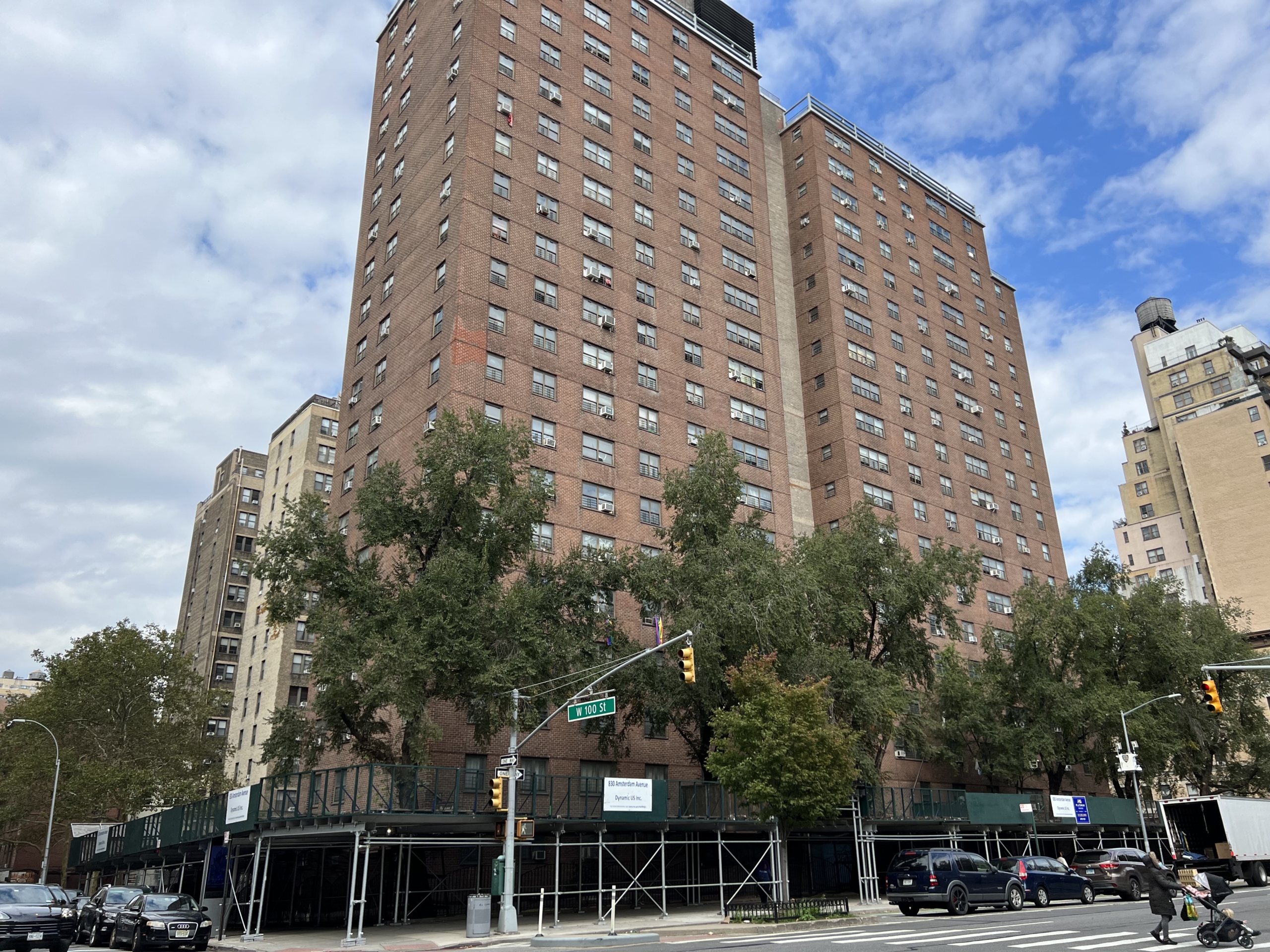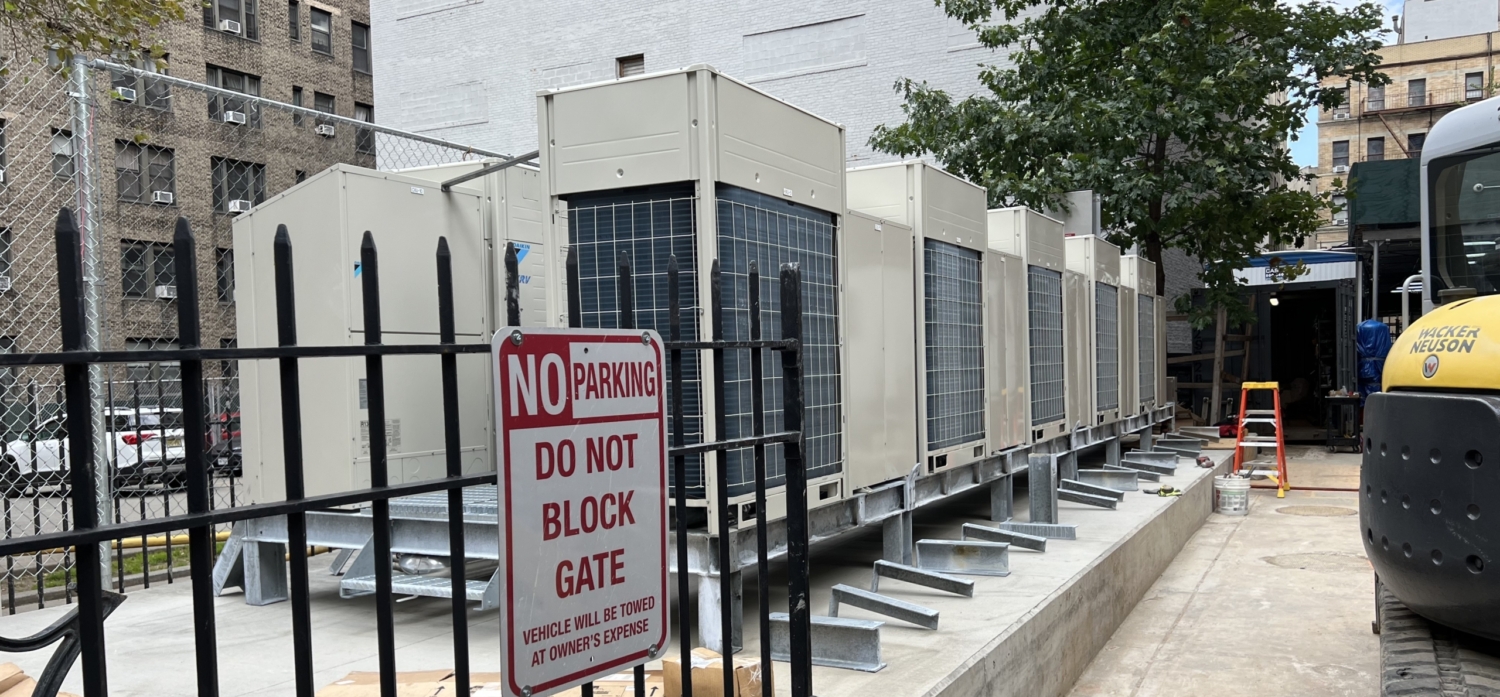
By Daniel Katzive
A two-year project to convert a public housing building to an electrically powered heat pump system is nearing completion on the Upper West Side. The 58-year-old 20-story tower at 830 Amsterdam Avenue (100th Street), part of the New York City Housing Authority (NYCHA) Frederick Douglass Houses development, is being retrofitted to provide heating, cooling, and hot water for residents – and to serve as a possible template for converting more of the 2,410 buildings NYCHA maintains citywide.
The $28 million project is part of NYCHA’s efforts to meet the ambitious goals set out in the city’s climate law, known as Local Law 97, whose requirements begin to go into effect next year. If the 830 Amsterdam project is deemed successful, it could be repeated at other buildings operated by NYCHA or private landlords.
The project is designed to reduce greenhouse gas emissions and give tenants more control over the temperature in their individual units. But officials say the complexities and disruption involved in a centralized heat pump installation also highlight the need for more scalable solutions as the authority replaces fossil fuel heating across its large portfolio of buildings.
In December 2021, NYCHA announced it was partnering with the New York Power Authority (NYPA), a state public power organization, to replace the aging boilers at 830 Amsterdam Avenue with a heat pump system, called variable flow refrigerant, that would deliver heat, hot water, and cooling to the building’s 159 units. The existing boilers in the building make steam by burning natural gas or heating oil, but the new system is powered by electricity from the grid.
The agencies said the new heat pump system would be the first of its kind at a public housing facility in New York state, and the Amsterdam building would be the first to move away from burning fossil fuels. That makes it “a model for the portfolio,” said Vlada Kenniff, the housing authority’s vice president for energy and sustainability, in a promotional video describing the project last year.
When completed, the system is projected to reduce local greenhouse gas emissions by 590 metric tons, the equivalent of removing approximately 130 cars from the road annually, according to NYPA’s calculations. The authority says that tenants also will gain more control over the temperature in their units as they will be able to directly adjust thermostats, along with fan speed and direction, an improvement from the traditional radiators which are on continually during heating season.
Engineering firm Dynamic US, headquartered in Westchester County, was selected to deliver the project and, according to NYCHA, work is now 80% complete. NYPA says the hot water systems are scheduled to begin running in December, while cooling will begin testing as temperatures warm in the spring of 2024, eventually replacing window A/C units currently in use.
When Local Law 97 begins to go into effect next year, privately-owned buildings larger than 25,000 square feet will be required to meet new energy and greenhouse gas emissions limits; a report on their progress is due in early 2025. Failure to meet goals can result in fines, though the city last month announced a plan that would allow owners to apply for extensions on meeting the requirements.
The law also applies to NYCHA properties, though the objectives and incentives work a bit differently for public housing: NYCHA must meet the legal goals on a portfolio-wide, rather than building-specific, basis. And rather than face financial penalties for falling short, the housing authority would only be subject to recommended remedial measures from the Mayor’s Office of Sustainability.
Heat and hot water for most of NYCHA’s properties are currently generated by traditional steam boilers fueled by natural gas or heating oil, accounting for two-thirds of NYCHA’s total energy consumption. The authority says that meeting the goals established by the climate law will require removal of fossil fuel burning systems from buildings and replacing them with electric-powered mechanisms while the state simultaneously moves to a low-emissions electric grid.
Electric-powered air source heat pumps work by transferring thermal heat from outside air into buildings (and vice versa during warmer months), using temperature differentials created by changes in pressure on a refrigerant. The process is similar to how a refrigerator or air conditioner work. For those still struggling with the concept of extracting warmth from outdoors on a freezing day, an article on the Energy Vanguard blog entitled “How the Heck Does a Heat Pump Get Heat from Cold?!” may be helpful.
The heat pump system at 830 Amsterdam appears to be nearly complete, but the project required extensive work within the building and within every apartment unit. While that work is now mostly complete, the disruption involved means it may not be a good template for all of NYCHA’s properties.
NYPA spokesman Paul DeMichele explained via email that “the complexities of the project motivated NYPA and NYCHA to think about other scalable solutions to bring heat pump technology to NYCHA residents.” An earlier effort to install a different kind of heat pump mechanism on the roof of the Fort Independence Houses in the Bronx experienced similar challenges, with program manager Jordan Bonomo quoted in a story about that project on the Grist media platform explaining, “Each apartment had a story. We quickly realized that while we like the technology, we couldn’t possibly scale that across our portfolio.”

In an effort to find a more scalable solution, NYCHA issued a challenge to manufacturers to come up with smaller heat pumps that could be installed in windows of individual units with less installation work than the centralized plant built for 830 Amsterdam. Prototypes were installed in 12 apartments at the Woodside Houses in Queens this summer, and initial reviews have been good, though the units do take up a lot of space inside the apartments and have not yet been tested by a New York City winter. Governor Kathy Hochul announced in September that 72 more window units would be installed in NYCHA properties this winter.
But the 830 Amsterdam project still could be a template for some NYCHA properties, and even privately owned buildings seeking to comply with the climate law. “The 830 Amsterdam project provides the template for meeting the decarbonization goals for NYCHA projects where comprehensive modifications are being made in each apartment,” said NYPA’s DiMichelle, who called it “a good example that proven heat pump technology can be retrofitted into existing residential buildings in New York City.”
As for the building’s residents, “the sooner they finish the better,” said Edward Jeter as he left the building on a recent Tuesday. Jeter says he has lived in the Douglass Houses since before 830 Amsterdam was completed. He said the disruption from the work has not been too bad and, in the end, it will be worth it. “It will be an upgrade,” he says.
To receive WSR’s free email newsletter, click here.









28 million dollars for 159 apartments? Typical NYC waste and corruption.
$28 million?
What makes the electricity?
What is the backup when the grid fails?
There is no backup
Heat pumps aren’t efficient below about 40 degrees F.
Also, most electricity generation involves burning something.
For the past 10 years of so many manufacturers have been making Cold Climate High Performance heat pumps which put out 100% of their output down to 10 degrees F and 75-80% down to -14 degrees F. They come in like in the photos as VRF systems as well as the normal big suitcase style system you commonly see on the outside of bodegas.
These look to be the latest VRF systems which are highly efficient, their only downsides are their cost and that there are only a handful of independent companies certified to repair these highly complex computerized,manufacturer specific VRF systems. That makes the cost of maintainence much higher than the normal heat pumps you see.
In any case, spending $175k per apartment is something only the city can afford to retrofit with using with our taxpayer dollars.
Interesting to learn. But as you say, expensive and complex to repair, so what happens when they go down.
Electricity still has to be generated, which often comes from burning.
This project shows how all electric heating is not feasible for any of the older residential buildings on the UWS, no matter how much it is touted by the Local Law 97 pundits.
Beyond the wild costs, the average building doesn’t have lots of outdoor space for heat pumps. And I say this as a fan of heat pumps!
In addition, the facade-mounted heat pump compressors are way more secure than window A/Cs which routinely fall out of windows. It’s not rocket science.
There is plenty of space on the facade like they do in most of the rest of the world. It’s just not allowed by NYC’s (or the rest of the US) building code.
It is allowed. Just not on landmark street-facing facades. But more people are putting them on courtyard facades. The DoB approves them plenty in the neighborhood.
So when the power grid fails during the winter they freeze.
Your oil or gas fired boiler will no longer function in a power outage either.
The city just love to waste money. Everyone is going to freeze. What a waste. These politicians love wasting money on stupidity. Just fix the boilers the way they are suppose to be fix. It’s like these politicians is agreeing to what we can have and not have. They talk about how they want electric cars being used.
At least with a gas stove you can still cook and stay warm in the event of ?
If you are using your gas stove to try and stay warm in a power outage you will probably set your home on fire.
Also do people rush to cook food in a power outage? The biggest risk of an outage is your building water tank won’t fill and then you don’t get water to flush your toilet.
How bout if and when the power grid is hacked or worse, and there is no power for days or weeks and you need to boil water or its the winter time how will you stay warm…..Cant do that with electric stove.
If the city’s power grid is ever taken offline for “weeks,” your electric stove not working will be the least of your concerns.
I’m not sure you realize that whenever something happens to gas lines in this city, it usually takes two to three years to fix.
Thank you for sharing this information, This is excellent news,
As to the cost, detractors need to realize that we are already paying heavily for natural disasters made more severe by climate change. The time to decarbonize is now, Waiting will only be more costly.
wait until you get the capital assessment charge from your coop/condo board to make these changes to comply with LL97. Then we will see how you feel about these unnecessary changes that are being forced on small building owners vs. the major polluters.
Wait until your building floods from another supercharged storm or the 1/2/3 is disabled for years due to erosion/water damage in tunnels.
The cost you front now is a FRACTION of the cost you mitigate from unchecked climate change. But we’re in the situation we’re in because Boomers sat on their hands for too long